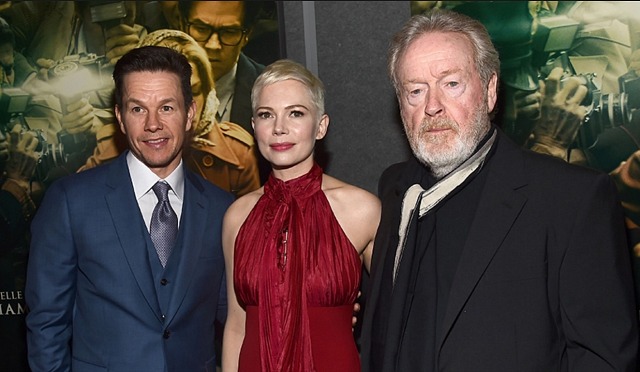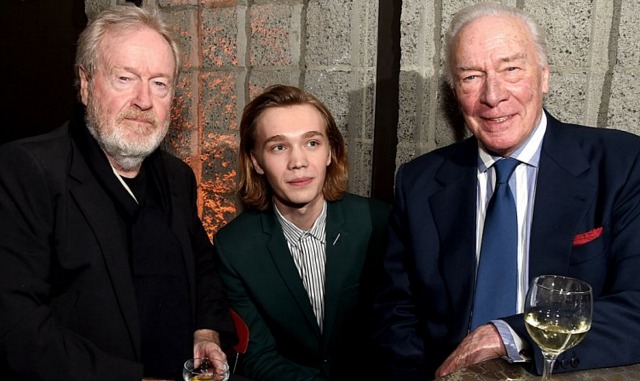I saw Ridley Scott‘s All The Money in the World (Sony, 12.25) for the second time last night at a big Academy premiere — talent, producers, actors, publicists, below-the-liners, people like me, etc. Scott and some of the cast attended (Mark Wahlberg, Christoper Plummer, Michelle Williams, Charlie Plummer, Timothy Hutton), and there was a big party afterward with loads of great-tasting food by Wolfgang Puck caterers.
All The Money is about a true-life event — the 1973 Rome kidnapping of John Paul Getty III and the laborious, months-long negotiations between the kidnappers and the young Getty’s tightwad grandfather, oil baron and billionaire J. Paul Getty, that followed. Scott doesn’t fool around with the story beats, and has made a stylish, well-finessed thing, jarring and intelligent and always believable.

Prior to last night’s Academy screening of Ridley Scott’s All The Money In The World — Mark Wahlberg, Michelle Williams, Scott.
The film is actually about tycoon vs. people values — a rumination about the real price of meat in the market, about how cold things can get when a capitalist emperor like Getty Sr. (chillingly played by Plummer) has been told to cough up or else when it comes to life of one of his own (Charlie Plummer, no relation), and how thorny and malignant life can be when hard bargainers are sparring over the size of a ransom. It’s a film about icy, eyeball-to-eyeball behavior on all sides.
Except, that is, when it comes to Gail Harris (Williams), the mother of the kidnapped scion who, as you might expect, doesn’t see the situation in monetary as much as human terms. And also, come to think of it, when it comes to Cinquanta (Romain Duris), a member of the Red Brigade kidnapping gang who becomes the young Getty’s closest captor and “friend”, in a manner of speaking. At the end of the day Cinqunata is almost as much on the human side as Gail.
In the Scott canon, All The Money in the World isn’t as cruel and ruthless as The Counselor, the 2013 drug-dealing drama that is arguably Scott’s finest 21st Century film, but it operates in the same chilly ballpark. Scott isn’t commonly associated with straight-talking dramas about upfront realism, but when he decides to settle down and make films for adults (i.e., stories about how things really are out there), there’s no one better.
We’ve all been impressed, I think, by Scott’s recent herculean re-filming of all the J. Paul Getty scenes (re-performed by Plummer when it became apparent in early November that the disgraced Kevin Spacey had to be jettisoned) between 11.20 and 11.30. Scott was given a longish standing ovation when he took the stage before the show began.
Remember the old days when people went to the plexes to see expertly written, well-acted stories about recognizable human behavior on the planet earth? That’s what All The Money In The World is doing — telling one of those stories. Shot in England, Rome and southern Italy. A tense tale about elite, exotic realms and clever operators, about semi-innocent victims and conniving sons-of-bitches, about secretive goings-on in Rome and rural farmhouses and the criminal low-lifes who operate in these realms, and about the finaglings of the super-rich and their flinty assistants, and all of it shot in slightly desaturated color.
And, welcomely, nobody gets laid in the film…no Wahlberg-Williams romance, no arguments, no teary emotion, none of that. Okay, some weeping and hugging at the very end.
The roughest scene is the one in which the kidnappers, angry after four months of waiting around, slice off their captive’s right ear and send it to the authorities,
Some out there will pay to see All The Money In The World and then say “why wasn’t this on Netflix?…how come it isn’t noisier and where are the fist fights and explosions and squealing car chases?” Scott actually delivers a shoot-out scene during Act Two, but it’s done realistically, which is to say over in a flash.
The complainers need to understand this is not just a film about a cheap and cruel sonovabitch billionaire, but about all of them and how they think.
I was delighted and excited to revisit Rome, and to run around and keep tabs on all the players and their maneuvers and shenanigans. I was especially pleased by Plummer and Williams’ performances (Wahlberg is totally fine as an operator and deal-maker for Getty Sr. but it’s a second-tier role for the most part). I also enjoyed Duris (whom I liked in Jacques Audiard‘s The Beat That My Heart Skipped) as well as Plummer the younger.

Prior to last night’s Academy screening of Ridley Scott’s All The Money In The World.
